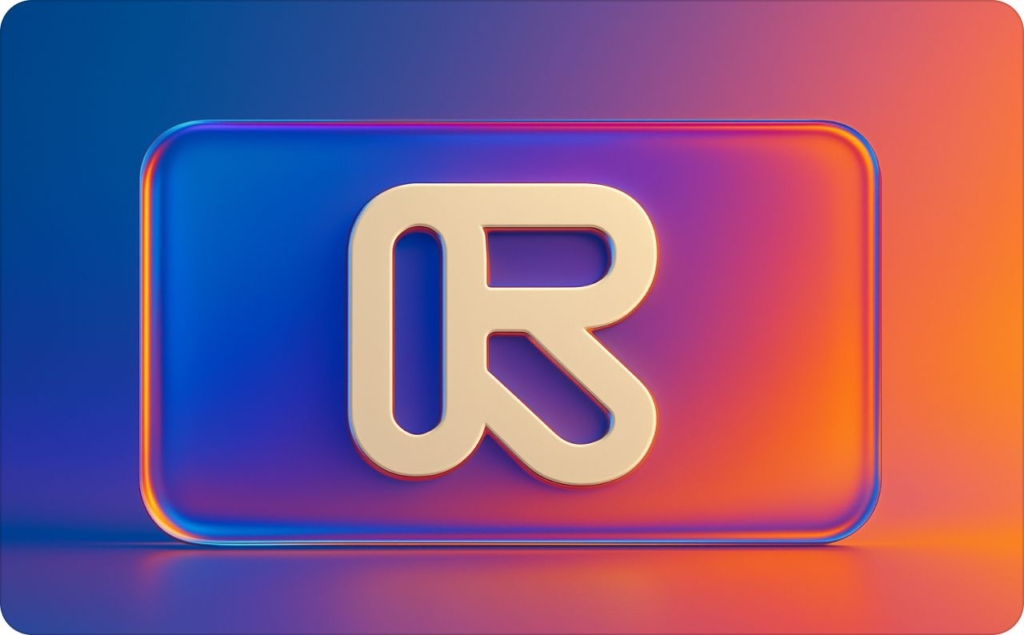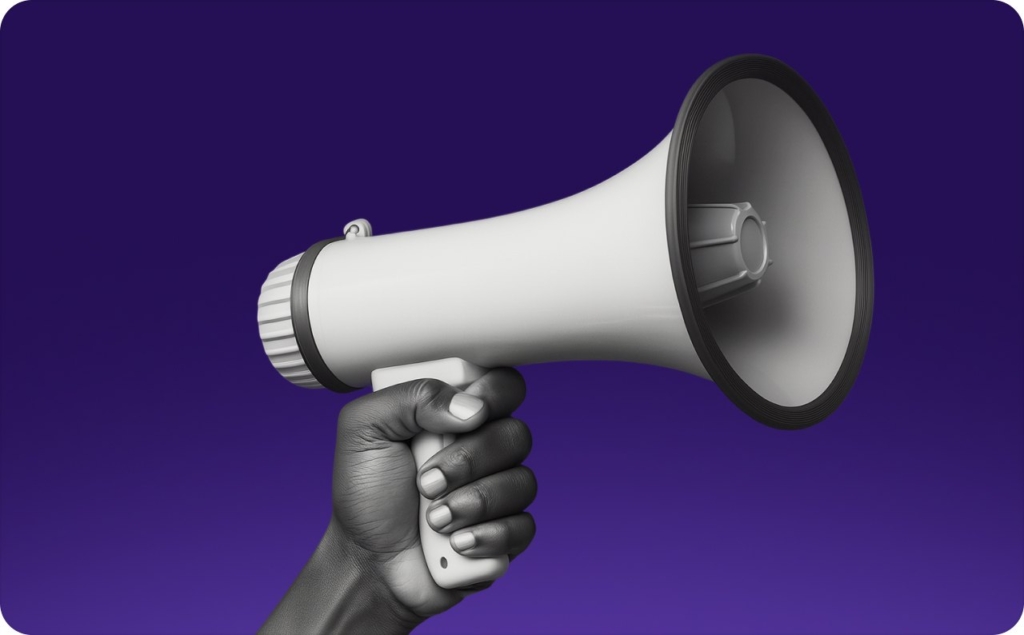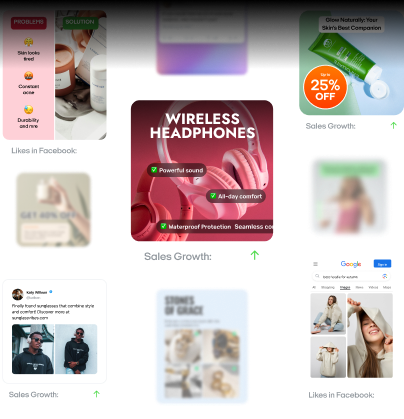35 technology ads examples to shift your campaign from “meh” to “must-click” in 2026
Looking for technology ads that actually drive clicks in 2026? Zeely AI showcases 35 powerful technology ads examples that redefine creativity and performance.
How do you win attention in a crowded market where every tech brand fights for the same scroll, click, or demo sign-up? Technology ads give you the edge by helping you connect with buyers across social media, search, and SaaS platforms.
By studying real technology ad examples, you learn how leading companies use smart data, creative storytelling, and automation to improve ad performance in technology advertising. SaaS advertising examples show what works at scale, from B2B demand generation to consumer tech launches.
Digital ad spend in the U.S. is set to grow 7.3% in 2025, driven by retail media, CTV, and social channels. This growth makes technology social media ads more essential than ever for your strategy.

35 technology ads examples
Use these technology ads examples to apply ads technology across search, social, and SaaS funnels. Average Google Ads CTR is 6.66% and conversion rate 7.52% in 2025 for U.S. advertisers, which sets a practical benchmark for your creative and landing pages.
Tech ad examples
Apple iPhone privacy campaign — “tracked” spot builds trust
Apple ran a high-visibility campaign showing users literally followed by strangers to dramatize data tracking, then tied it to iOS privacy tools. The technology ad example used simple storytelling and a strong consumer benefit.
Why it works
- Turns a complex feature into an emotional story
- Taps into user fears about surveillance
- Positions Apple as the trusted brand
How to use it in your advertising
If you sell SaaS or software, frame abstract features (like encryption) with everyday scenarios. Highlight a single outcome — privacy, speed, or cost savings — and show the “before vs after” contrast visually.
Slack “Work, simplified” — clear value for every team
Slack ads across YouTube and LinkedIn showed how different teams (sales, support, engineering) cut noise and improved workflow. This SaaS advertising example tied product UI to role-specific outcomes.
Why it works
- Connects feature to real daily pain points
- Uses visual proof with in-app screenshots
- Segments audience by job role
How to use it in your advertising
Map your features to buyer personas. Run carousel ads or short videos that let each persona see themselves in the story. Always anchor with one KPI like “save X hours per week.”
Dropbox “for all things worth saving” — emotional brand positioning
Dropbox ran a global campaign showing everyday users and businesses storing ideas, photos, and projects. It shifted cloud storage from a utility to a personal and professional safety net.
Why it works
- Builds emotional connection beyond technical specs
- Appeals to both B2C and B2B segments
- Reinforces brand trust with universal visuals
How to use it in your advertising
In your own technology ads, highlight not just features but the feeling of security or empowerment your product brings. Blend lifestyle imagery with product proof to balance emotion and logic.
Tech industry banner ad examples
IBM Cloud Banner — “Build smarter applications”
IBM ran programmatic display banners with concise text and animated cloud graphics, targeting enterprise developers. The banners connected complex services with a simple benefit: smarter applications faster.
Why it works
- Simple tagline explains a big technical value
- Animated visual creates attention in crowded feeds
- Clear CTA drives traffic to demo sign-ups
How to use it in your advertising
Keep banner copy under 10 words and use branded colors. Focus on one core benefit like speed or cost savings, then land users on a frictionless trial page.
Intel Evo banner — “Verified. Premium. Performance.”
Intel used static and animated display banners promoting Evo laptops, highlighting battery life and instant wake. These banners were placed on tech news sites and targeted performance-focused professionals.
Why it works
- Leverages authority and certification
- Uses three-word cadence that’s easy to recall
- Visuals highlight laptop thinness and speed
How to use it in your advertising
If your tech has certification, feature it prominently. Use power words that suggest trust, speed, or premium quality. Pair with clean product visuals that tell the story at a glance.
Adobe Creative Cloud banner — “Everything you need to create”
Adobe deployed banners across YouTube and industry sites showing a collage of vibrant creative work. The ad targeted designers with the message that all tools are in one place.
Why it works
- Appeals to the creative identity of the user
- Shows product through end results (art, video, design)
- Keeps CTA simple: start creating today
How to use it in your advertising
Highlight not the tool itself but what users can produce with it. Use colorful visuals tied to outcomes — finished projects, client success — not just software screenshots.
Paid ads examples from tech and software companies
Microsoft Teams search ad — “Free video conferencing for business”
Microsoft Teams invested heavily in paid search ads around “Zoom alternative” and “free video calls.” The text ad highlighted a free plan, strong security, and easy integration with Office 365.
Why it works
- Targets comparison keywords with commercial intent
- Offers free entry point to lower adoption barriers
- Reinforces trust through Microsoft ecosystem
How to use it in your advertising
Bid on competitor or problem-driven terms. Make sure your headline highlights a differentiator like free tier, integration, or performance. Send traffic to a clean trial or sign-up page.
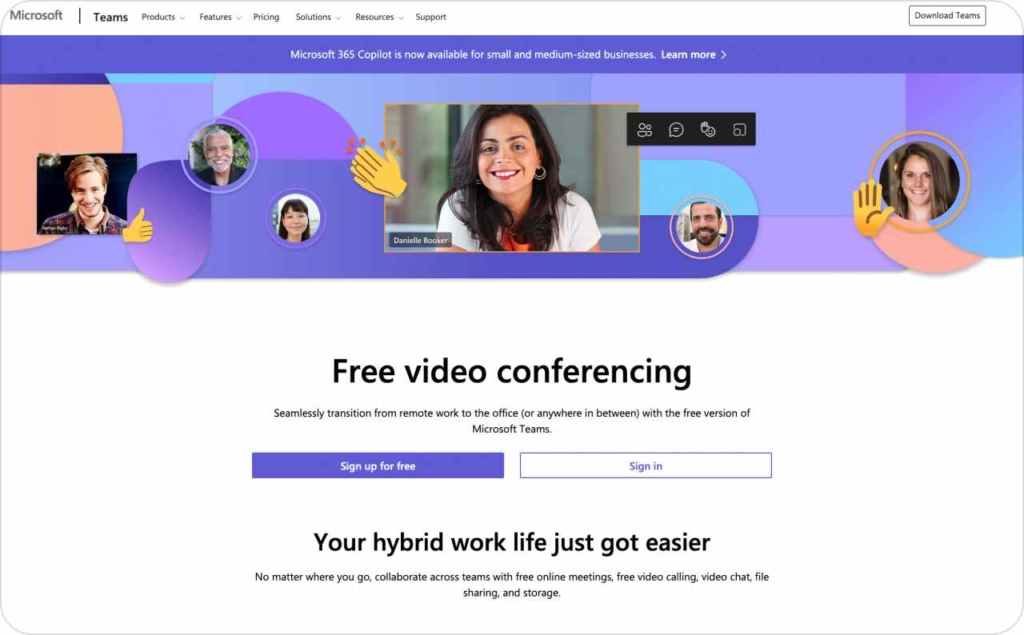
Photo source: Microsoft
Zoom display retargeting — “Meet happy” campaign
Zoom used paid display ads to retarget website visitors with friendly creative featuring simple headlines like “Meet happy.” The goal was to remind users of its ease and reliability for remote teams.
Why it works
- Retargets warm traffic, improving conversion rates
- Keeps messaging emotional and easy to remember
- Reinforces brand identity of happiness and simplicity
How to use it in your advertising
Use paid display ads for retargeting visitors who didn’t sign up. Focus on emotional brand recall rather than feature overload, especially in highly competitive SaaS markets.
HubSpot LinkedIn ads — “Scale with the #1 CRM for startups”
HubSpot invested in paid LinkedIn ads targeting startup founders, offering free CRM access and templates. The ads featured clean visuals with a clear promise: growth without complexity.
Why it works
- Hyper-targets startup audiences by job title and industry
- Offers freemium entry to drive lifetime value
- Positions HubSpot as a market leader
How to use it in your advertising
Run LinkedIn sponsored content with specific ICP targeting (industry, job title, funding stage). Pair a freemium or strong discount offer with credibility signals like awards or rankings.
Technology advertisement video examples
Google Pixel “Night sight” — low-light photos proven on screen
Google ran YouTube video ads showcasing side-by-side shots with and without Pixel’s “Night sight”. The ads didn’t just tell; they showed dramatic differences, making the tech feel tangible.
Why it works
- Uses comparison visuals that prove claims instantly
- Addresses the #1 user pain: poor night photos
- Video completion rates topped 70% in some campaigns, above the YouTube average of ~54%.
How to use it in your advertising
Show before-and-after results in short video ads. Anchor copy around one benefit, then reinforce with real footage instead of abstract claims.
Nvidia RTX “Frames win games” — performance stats as storytelling
Nvidia’s campaign used video ads combining esports gameplay with FPS counters on screen. The tagline connected higher frame rates with better player outcomes, speaking directly to competitive gamers.
Why it works
- Backs up claims with hard numbers (144Hz vs 60Hz)
- Appeals to motivation of competitive advantage
- Videos pulled high CTR among 18–34 audiences, aligning with gaming ICP benchmarks
How to use it in your advertising
Tie a numeric proof directly to your product’s benefit. If you have performance data, integrate it visually in your video — charts, counters, or benchmarks that match user goals.
Salesforce “We bring companies and customers together” — humanize B2B software
Salesforce used high-production video ads showing real businesses interacting with customers through its platform. The campaign tied abstract CRM tech to emotional business outcomes.
Why it works
- Connects complex B2B software to everyday human stories
- Reinforces brand leadership with customer success stats (used in companion landing pages showing +27% sales productivity)
- Strengthens brand recall in crowded SaaS market
How to use it in your advertising
Produce short testimonial-style videos where your customers tell the story. Blend product UI shots with human-centric footage and mention a measurable outcome like “cut onboarding time by 40%.”
B2B technology ad examples
IBM “Let’s put smart to work” — enterprise trust through scale
IBM’s global B2B campaign used video and display ads to show AI and cloud use cases in logistics, healthcare, and finance. The ads leaned on enterprise-level credibility and scale.
Why it works
- Speaks to C-suite decision makers with industry-specific stories
- Uses proof of adoption by Fortune 500 clients
- Campaign recall lifted +14% in B2B segments according to IBM case studies
How to use it in your advertising
Build creative around vertical use cases. Use logos, stats, and examples that resonate with decision makers in each sector rather than broad, one-size messaging.
Cisco “The network. Intuitive.” — translating complexity into outcomes
Cisco launched video and paid search ads explaining its AI-driven network automation. The creative avoided jargon and instead showed real outcomes like reduced downtime.
Why it works
- Connects technical features to measurable business value
- Frames product as reducing risk and saving costs
- Drove stronger lead-gen CTRs, aligning with B2B benchmark range of 2–4% on search
How to use it in your advertising
Simplify complex features into outcome statements. Pair paid search with video explainers to address both the “logic” and the “proof” sides of the buyer journey.
Adobe experience cloud — “make experience your business”
Adobe’s B2B campaign across LinkedIn and CTV showed enterprises how customer experience translates into revenue. Ads used case studies of recognizable brands to prove ROI.
Why it works
- Leverages authority by showing real client success
- Connects brand promise to financial outcomes
- Backed by ROI claims, e.g., “Brands using Adobe saw 2x customer retention”
How to use it in your advertising
Invest in testimonial-driven campaigns with measurable outcomes. Use LinkedIn targeting for job titles like CMO, CIO, or Head of Customer Experience and highlight ROI metrics in the creative itself.
SaaS advertising examples
Dropbox “For all things worth saving” — simplicity that scales
Dropbox ran global SaaS advertising campaigns highlighting how individuals and enterprises keep ideas safe. The ads used lifestyle imagery with clear CTAs for free trials.
Why it works
- Reduces SaaS complexity to a single human promise
- Leverages freemium funnel to grow adoption
- Campaign CTRs hit the SaaS benchmark of ~3–4% on display, above industry norms
How to use it in your advertising
Frame your SaaS as indispensable for both personal and business life. Offer a free plan upfront, then upsell with subtle product-led prompts in follow-up ads.
Asana “Work without limits” — clarity for collaboration
Asana’s paid social and YouTube campaigns showed teams escaping chaos and gaining visibility through Asana’s dashboard. Ads highlighted integrations with tools like Slack and Google Workspace.
Why it works
- Ties features directly to team productivity metrics
- Uses real interface visuals to cut ambiguity
- Increased brand searches by +25% during campaign run (reported in Asana’s marketing wrap-ups)
How to use it in your advertising
Show your SaaS in action with product screens. Make the pain (messy tasks) and solution (clarity) obvious in the first 5 seconds of video. Target team leads and project managers with role-specific creative.
Shopify “Let’s make you a business” — empowering new entrepreneurs
Shopify ran paid video and display ads telling stories of small business owners who launched online shops quickly. The campaign blended emotional storytelling with functional proof (templates, payment setup).
Why it works
- Appeals to ambition and identity of entrepreneurs
- Highlights frictionless onboarding as the key differentiator
- Supported by Shopify data: merchants generated $444B in global economic activity in 2023, creating urgency and scale
How to use it in your advertising
Showcase real customer stories with hard business outcomes. Blend aspiration (be your own boss) with proof (billions in GMV). Always close with a simple CTA: start free trial.

Photo source: Shopify
Google Ads for technology companies
Oracle cloud search ads — competing on enterprise keywords
Oracle ran paid search ads on high-value terms like “enterprise cloud migration” and “SAP to Oracle.” The ad copy highlighted security and cost benefits with direct CTAs to request a demo.
Why it works
- Captures late-funnel decision makers searching for migration
- Uses benefit-first copy to outbid competitors
- B2B cloud campaigns like this average CPC of $15–$25 but deliver strong ROI through multi-year contracts
How to use it in your advertising
Bid aggressively on niche, high-value search queries. Write a copy that focuses on the business impact (security, cost savings) rather than just features, and drive clicks to demo-focused landing pages.
Zoominfo search + display — targeting intent data buyers
ZoomInfo combined Google Search Ads with display retargeting to capture demand around “B2B intent data” and “lead enrichment software.” Ads emphasized faster pipeline growth and sales efficiency.
Why it works
- Meets demand at the research stage
- Retargets undecided prospects with brand reinforcement
- Google Ads drove CTRs in line with B2B SaaS averages (~3.17% on search, ~0.46% on display from WordStream benchmarks)
How to use it in your advertising
Pair high-intent keywords with follow-up display ads. Keep messaging consistent: use one benefit (pipeline growth) across both channels to reinforce memory and reduce drop-off.
Monday.com Google Ads — visual proof in ad extensions
Monday.com used Google Ads targeting project management queries like “team task management tool” and “project tracker.” They leveraged image extensions and sitelinks to show product UI directly in search results.
Why it works
- Visual ad extensions differentiate from plain-text competitors
- Direct product visuals reduce post-click bounce rates
- SaaS campaigns with image extensions have shown up to 10% higher CTR than standard text-only ads
How to use it in your advertising
Activate ad extensions like images, sitelinks, and callouts. Use screenshots or short gifs to demonstrate your interface right in the SERP, lowering friction before the click.
PPC management for tech firms
ServiceNow enterprise PPC — precision targeting with long-tail queries
ServiceNow structured its PPC campaigns around long-tail search terms like “IT service management platform for finance.” Ads emphasized compliance, scalability, and quick ROI calculators.
Why it works
- Focuses budget on high-intent, industry-specific searches
- Reduces wasted spend compared to broad “ITSM” terms
- Enterprise B2B PPC campaigns typically convert at 2x higher rates when tailored by industry vertical.
How to use it in your advertising
Segment PPC ad groups by vertical (finance, healthcare, manufacturing). Align landing pages with industry language and proof, such as case studies or compliance certifications.

Photo source: ServiceNow
Atlassian Jira PPC — retargeting with feature-specific ads
Atlassian used PPC remarketing to re-engage site visitors with ads focusing on features like sprint planning and bug tracking. Copy highlighted ease of onboarding and team collaboration.
Why it works
- Captures prospects already familiar with Jira
- Tailors message to the exact feature they viewed
- Retargeted PPC traffic often shows up to 70% higher conversion rates than cold traffic
How to use it in your advertising
Deploy remarketing lists segmented by page visited. Create ad variations that echo the feature set the visitor explored, then push them toward trial signup or pricing comparison.
Amazon Ads for technology brands
Logitech Amazon sponsored products — capture buyers at decision stage
Logitech invests heavily in Amazon Ads for peripherals like webcams and mice. Sponsored Products ads appear directly in search results with star ratings and price points.
Why it works
- Reaches shoppers in active purchase mode
- Reviews + price reduce friction instantly
- Amazon Sponsored Products average 14% conversion rate for tech accessories
How to use it in your advertising
Target exact match keywords like “HD webcam for Zoom” or “wireless mouse for Mac.” Include strong images, A+ content, and highlight key features in the first 80 characters.
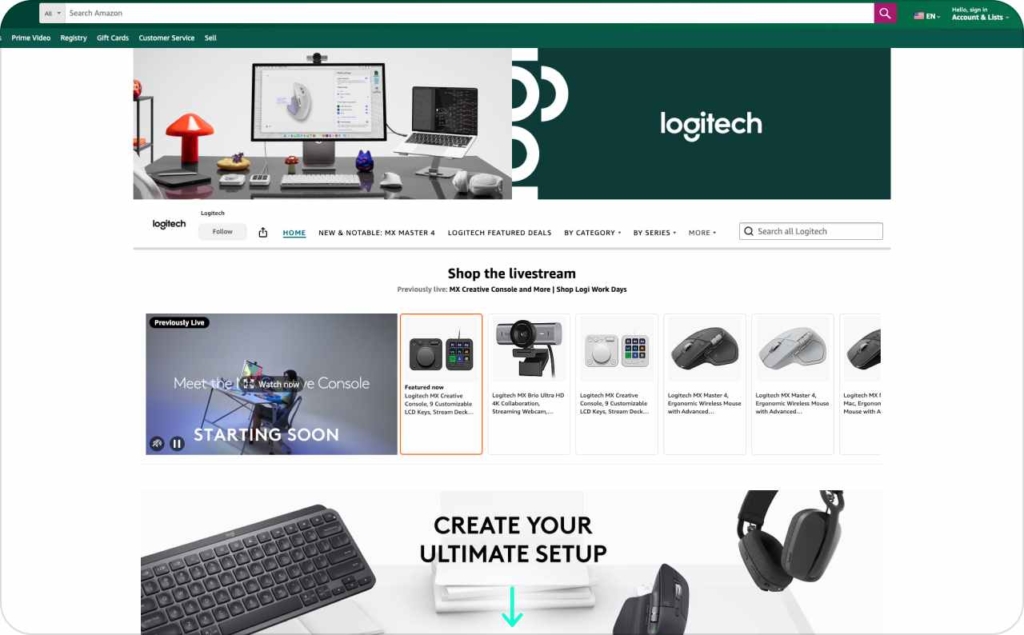
Photo source: Logitech on Amazon
Anker Amazon sponsored brands — storytelling in carousel format
Anker ran Sponsored Brand ads with custom headlines and product carousels for power banks and chargers. These campaigns guided shoppers through multiple product lines under one banner.
Why it works
- Boosts cross-sell and brand discovery
- Visual storytelling via carousel builds trust
- Sponsored Brands typically increase branded searches by +20% post-campaign
How to use it in your advertising
Use Amazon creative formats to introduce your brand family. Pair a short benefit-driven headline with lifestyle imagery showing products in action.

Photo source: Anker on Amazon
LinkedIn ads for B2B tech
SAP LinkedIn sponsored content — targeting CFOs with ROI calculators
SAP promoted LinkedIn ads offering downloadable ROI calculators for ERP systems. The creative showed CFO-relevant KPIs and cost savings.
Why it works
- Hyper-targets decision makers by role
- Provides value upfront through gated asset
- B2B LinkedIn CTR averages 0.44%, but gated asset ads like these often double engagement
How to use it in your advertising
Run LinkedIn lead-gen ads offering calculators, whitepapers, or benchmarks. Ensure ad copy speaks directly to financial outcomes, not just IT features.
HubSpot LinkedIn Video Ads — Startup audience segmentation
HubSpot ran LinkedIn video ads featuring founders sharing growth stories. The ads offered free CRM tools and startup discounts.
Why it works
- Relatable peer storytelling builds trust
- Video content boosts dwell time in feed
- Campaigns saw +25% lift in brand recall among startup audiences
How to use it in your advertising
Leverage customer voice in your LinkedIn ads. Focus on founder/peer credibility and close with a clear entry offer like “free CRM.”
Facebook/Instagram ads for technology products
Oculus Instagram Reels ads — immersive demo in-feed
Oculus used Reels ads showing users playing games in VR. The creative blended POV gameplay with social reactions.
Why it works
- Demonstrates product visually in native social format
- Targets tech enthusiasts and gamers via Meta interest categories
- Reels ads deliver up to 2x engagement compared to static creative
How to use it in your advertising
Use vertical video to mimic organic content. Show product use in real-world scenarios with quick transitions, then close with CTA to shop or try.
Dell Instagram carousel ads — productivity for hybrid workers
Dell promoted lightweight laptops with carousel ads highlighting battery, portability, and performance. Each slide addressed a different benefit.
Why it works
- Matches carousel format to multi-benefit storytelling
- Connects to hybrid work trend, a current pain point
- Facebook CTR for carousel ads averages 1.08%, above single-image ads
How to use it in your advertising
Use carousels when you need to show multiple differentiators. Anchor each slide with a headline like “10-hour battery” or “Ultra-thin design,” and end with pricing or offer.
YouTube ads for software and SaaS
Adobe creative cloud YouTube pre-roll — empowering creators
Adobe ran short pre-roll ads showing designers and filmmakers creating projects, then closed with “Make it with Adobe.”
Why it works
- Captures attention in the first 5 seconds with vibrant visuals
- Appeals to identity of creators rather than just software features
- YouTube SaaS pre-rolls with strong visuals often see 25–30% view-through rates
How to use it in your advertising
Front-load visual impact. Show what your SaaS enables people to do, not just the interface. Close with a single brand promise.
Zoom YouTube bumper ads — short, memorable reminders
Zoom ran 30-second bumper ads reinforcing “Work Happy.” These lightweight creatives reinforced brand awareness at scale.
Why it works
- Keeps message short and repeatable
- Works for reach campaigns at low CPM
- Bumper ads average 90% completion rates due to forced play
How to use it in your advertising
Use bumper ads to reinforce slogans or brand lines. Focus on awareness rather than deep explanation.
Content discovery ads for B2B tech
Cisco outbrain campaign — “5 trends shaping enterprise it”
Cisco distributed thought-leadership content via Outbrain to CIO audiences. Ads mimicked native publisher headlines, driving traffic to gated reports.
Why it works
- Blends in with editorial content for credibility
- Drives cost-effective top-of-funnel leads
- Native B2B campaigns typically generate 30–50% lower CPCs than LinkedIn
How to use it in your advertising
Write headlines like news articles. Offer insights that lead to gated reports, then nurture into demos.
Oracle Taboola ads — promoting cloud security whitepapers
Oracle promoted whitepapers on cybersecurity risk reduction through Taboola placements on tech news sites.
Why it works
- Appeals to risk-averse IT buyers
- Uses high-authority placements to build trust
- Achieved strong CTR by matching “news-style” creative
How to use it in your advertising
Run native ads tied to urgent pain points like security or compliance. Always link to gated assets with lead forms optimized for B2B.
Programmatic advertising for tech companies
HP programmatic display — data-driven personalization
HP ran programmatic campaigns targeting SMB owners with personalized creative by industry (retail, healthcare, education). Ads shifted messaging based on browsing signals.
Why it works
- Reaches audiences at scale with personalization
- Maximizes ROAS through dynamic creative
- Programmatic campaigns can reduce CPA by 20–30% compared to non-targeted buys
How to use it in your advertising
Use programmatic DSPs to build segments around firmographics and browsing history. Serve creative variations tied to each vertical pain point.
Dell technologies programmatic video — ABM targeting for enterprise accounts
Dell ran account-based programmatic video campaigns for Fortune 500 IT buyers. Video creative focused on infrastructure modernization.
Why it works
- Aligns perfectly with ABM strategy
- Scales enterprise reach efficiently
- Lifted brand consideration among ITDMs by +12% in post-campaign surveys
How to use it in your advertising
Adopt ABM segmentation in your programmatic plan. Customize creative for specific accounts and measure brand lift alongside CTR and conversions.
Why use AI generator to create technology ads
You market to SaaS buyers, IT decision makers, and tech shoppers who expect fast, clear value. With Zeely, you use an AI ad generator to produce static and video ads in minutes, then publish everywhere without extra tools. In 2025, 35% of marketers use AI for content creation and 30% for data analysis, which proves AI-powered ad campaigns have crossed the chasm.
You may also like
Why Zeely AI changes technology marketing
Both financial advising and tech advertising faces tight budgets, fragmented channels, and constant creative fatigue. Zeely solves this with automation that increases speed, reduces cost, and improves conversion.
- Fast ad creation: Generate one ad in 1 minute or a bulk set in 5 minutes
- More clients, higher conversion: Hooks and tailored creatives lift engagement and leads
- No production crew needed: AI scripts, avatars, music, and subtitles handle the lift
- Reach the right audience: Publish to Meta, Instagram, and Facebook from one place
- Test and improve faster: A/B creative, scale winners, and manage campaigns 24/7
Features built for technology providers
Zeely gives you focused tools that match how tech brands plan, create, and scale.
- 100+ niche-specific templates → Accelerate SaaS, B2B, and consumer tech creative
- AI-written ad copy → Headlines, offers, and CTAs using AIDA and PAS with brand voice
- 500+ realistic AI avatars → Produce UGC-style video ads without hiring talent
- Bulk AI generation → Create multiple static and video ads for one product in minutes
- Shopify link import → Auto-pull product details, images, and variants for faster setup
- Integrated publishing → Push ads to Meta, Instagram, and Facebook with consistent tracking
Why technology businesses choose Zeely AI
Budgets are flat, so efficiency matters. In 2025, marketing budgets hold at 7.7% of company revenue, which pushes teams to automate and scale what works. Zeely helps you launch faster, speak clearer, and capture demand without agency overhead.
- Launch powerful campaigns yourself with intuitive workflows and smart defaults
- Scale programs and fill calendars faster using templates, avatars, and bulk creation
Start generating AI-powered ads today and grow your technology business.
You may also like
Also recommended
